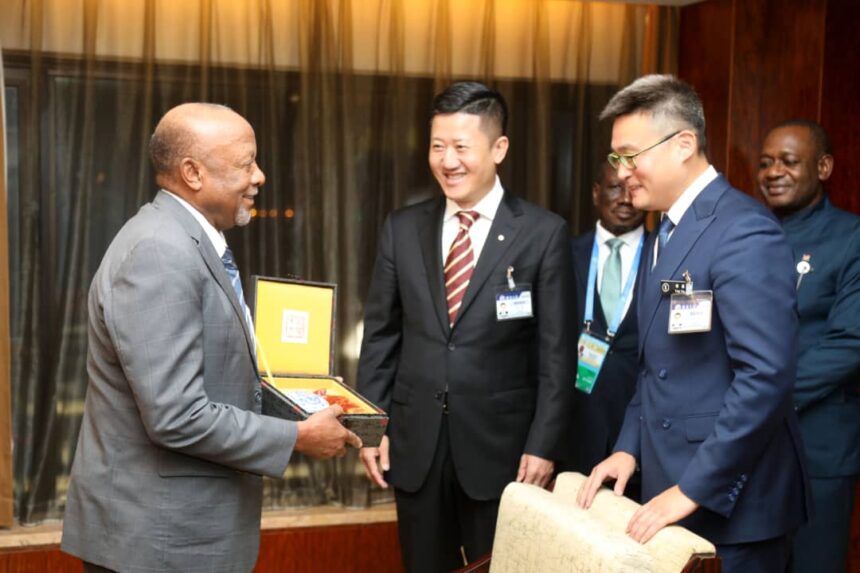BEIJING – President Nangolo Mbumba yesterday stated that Namibia’s unique blend of political stability, friendly people and abundant natural resources makes it a conducive business environment that fuels economic growth.
While inviting prospective Chinese businesses to the country, the President added that Namibia is committed to achieving economic self-reliance, and to transition from reliance on the export of raw minerals towards innovative development and processing of natural resources into finished products.
“There is no reason why you should not choose Namibia because the largest Chinese investment in Africa is in Namibia, represented by China General Nuclear, also known as Swakop Uranium, operating the Husab Mine, as well as China National Uranium Group of the China National Nuclear Corporation.
Both these and others make Namibia the third-largest producer of uranium worldwide,
which is beneficial for the economic growth of our two countries,” said the head of State at the Namibia-China High-Level Business Seminar.
The seminar was hosted on the sidelines of the ninth Forum on China-Africa Cooperation (Focac), which started yesterday and concludes tomorrow.
Namibia is part of Focac.
Around 50 African leaders are attending the summit.
Mbumba said it presents an excellent opportunity for Namibian and Chinese enterprises to engage and discover business opportunities on offer in the two countries.
“Chinese enterprises, working hand in hand, and joint ventures with Namibian entrepreneurs, can take advantage of these opportunities for mutual benefit. We require strategic partners from China with the requisite technology, skills know-how and capital to work with us to transform the Namibian economy from primary production towards a fully-industrialised, knowledge-based, technologically-advanced, high value-added economy,” he noted.
In the last decade, China invested over US$120 billion into African infrastructure projects through its Belt and Road Initiative (BRI), funding hydropower plants, railways and roads across the continent.
Major projects overseen by Chinese businesses in Namibia include the country’s largest cement manufacturing company Ohorongo Cement, which was acquired by West China Cement Group in 2020.
In 2023, Huayou Cobalt Group of China invested in a lithium development project in Namibia.
“Equally important, very recently, China’s Sino-mine Resources Group invested in acquiring a major copper-smelting and processing facility in Tsumeb, Namibia. Similarly, Yintai Gold of China is in the process of finalising its investment transaction of the acquisition of the Twin Hill Gold mine project in Namibia,” said the politician.
He stated that these are just some testimonials of Chinese companies investing in Namibia, which shows great confidence in the country’s economic growth, reiterating the need for more business ventures in Namibia.
Mbumba beamed that Namibia and China have a long-standing bilateral relationship, built on friendship, mutual benefit and respect for a brighter shared development future.
“Our diplomatic relations are governed by the Comprehensive Partnership Agreement between our two countries, which defines Namibia-China relations, premised on the principles of mutual respect, non-interference in domestic affairs and the pursuit of shared prosperity,” he continued.
To date, Namibia and China have established a strong trade partnership, with China consistently ranking among Namibia’s top three key export and import markets.
The Head of State said: “Key sectors of priority include mineral benefaction, oil and gas, renewable energy, chemicals, cosmetics, tourism and agro-processing. To calibrate sectoral competitiveness, the government will launch the Namibia Trade Policy, which forms the cornerstone of our strategy for economic growth and industrial development”.
He stated that the goal is to establish new industries which will serve as magnets for fresh investments and skilled personnel.
“Similarly, we are ranked as the second- most well-governed country in Africa, the second-fastest growing emerging market for foreign direct investment in Africa, and the fifth-most peaceful country globally,” he boasted.
He noted that connectivity is vital for the movement of people, goods and services.
“Today, Namibia is ranked first in Africa for its quality of roads networks. In that vein, as part of our objective to become a key logistics hub in southern Africa, Namibia has scaled up significant investments in its ports infrastructure, including the construction of a new container terminal at the Port of Walvis Bay to enable efficient and effective processing of high volumes of cargo,” he remarked.
The country is close to completing the Airport Road that connects the Hosea Kutako International Airport to the Port of Walvis Bay to allow more cargo to and from Namibia.
It also aims to link neighbouring landlocked countries such as Zimbabwe, Zambia and Botswana to global markets.
–psiririka@nepc.com.na



